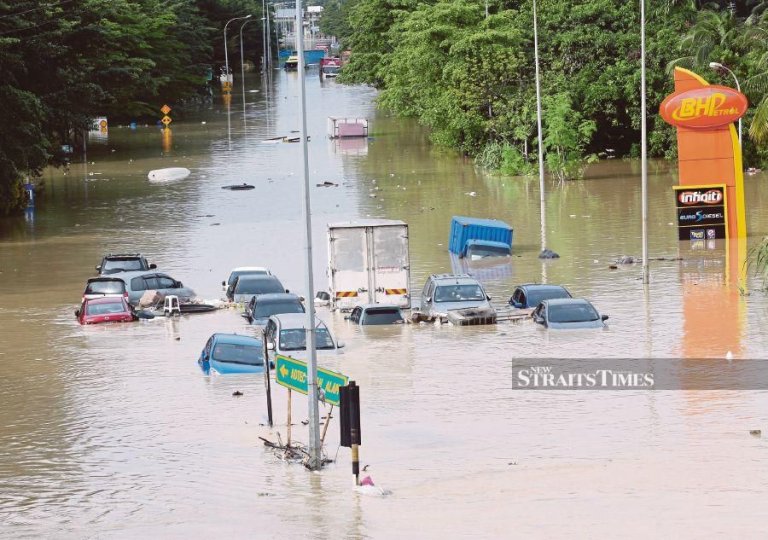Malaysia is no exception to facing climate change issues, as seen in last year’s floods, which were caused by unusually heavy rain brought by the northeast monsoon.
In Southeast Asia, the Philippines and Indonesia were also affected by the monsoon.
Germany, Europe’s largest economy, was also devastated in July last year by floods due to extreme summer rain.
These extreme weather events were blamed on climate change.
Is our government is ready to deal with climate change-induced disasters in the future?
Goal 13 of the United Nations Sustainable Development Goals (SDGs) said that immediate action is needed to combat climate change.
Can we achieve this before 2030? The UN climate change conference (COP26) in Glasgow last year highlighted various climate change goals, with the primary objective to safeguard communities and their natural environments.
Emergency preparedness and proper disaster management in the recent Selangor flood crisis indicate that our climate ambition and action in these unprecedented times were inadequate.
Approximately 150,000 people were forced to flee their homes due to the floods. It has also resulted in the deaths of more than 50 people, while are five still missing.
The slow response to aid victims, like in Taman Sri Muda, could be the main cause of many being stranded for days.
Environmentalists, academicians and human rights activists are saying that the authorities had failed to communicate effectively about the floods.
Most people did not expect their homes to be inundated with water. A lack of proper emergency communications had made victims rely on social media.
Experts have also warned that deforestation, illegal logging and mining can contribute to flooding. According to Global Forest Watch, Pahang lost 22.0 million hectares of natural forest by 2021, equating to 16.2 million tonnes of CO2 emissions.
Mining continues in states like Pahang, Kelantan and Selangor. This must stop.
Mining has also disrupted the ecosystem at Tasik Chini in Pahang. The de-gazettement of forest reserves, like Bukit Lagong, Ulu Gombak and Rantau Panjang for development could further harm the ecosystem.
Poor urban planning may also be a factor in the recent floods. Too much urbanisation may damage the environment.
For example, cities in Selangor, like Klang and Shah Alam, lack climatic systems that can warn of any natural disasters. Effective planning and management approaches can make a difference.
The government and allied agencies should strengthen green policies as part of their mitigation efforts. Firm commitment to zero deforestation can prevent development that have adverse impacts on the environment.
Malaysia should also focus more on the green economy while rapid decarbonisation for future development could be a form of environmental defence and resilience in avoiding further loss of lives and livelihoods caused by disasters.
In this regard, local authorities should allow public participation in climate action agendas to enable transparency in decision-making.
Inclusiveness in climate action is the only way to make the public, especially the vulnerable and highly affected by climate change problems, like floods, understand how policies work for them.
Education is vital. The Education Ministry must promote sustainable and environmental education in primary, secondary and tertiary education.
Of course, it won’t be easy to implement all of these measures, but they should be considered to avert climate catastrophes.
The government must display greater leadership by acting boldly as this is the only way to secure the wellbeing of the people.
When Tan Sri Muhyiddin Yassin was prime minister, the government set up the Malaysian Climate Change Action Council, a central platform to chart climate change policies and actions across federal and state governments.
The council’s foci were on a national master plan for low-carbon cities, a low-carbon mobility blueprint 2021-2030 and a carbon pricing mechanism, while also addressing the impacts of the Covid-19 pandemic.
Muhyiddin also launched proactive steps to align Malaysia’s green financing agenda and projects with the Sustainable Development Goal and the Shared Prosperity Vision 2030.
It is high time the current government reassess its strategies and plans to preserve the environment and bring social stability to climate challenges.
The writer is a research analyst at Institut Masa Depan Malaysia
The views expressed in this article are the author’s own and do not necessarily reflect those of the New Straits Times
Date: 22 January 2022
Image source: https://assets.nst.com.my/images/articles/11bhtenggelam2_1642780851.jpg
Source: New Straits Times – https://www.nst.com.my/opinion/columnists/2022/01/765031/government-must-show-leadership-tackling-climate-change




